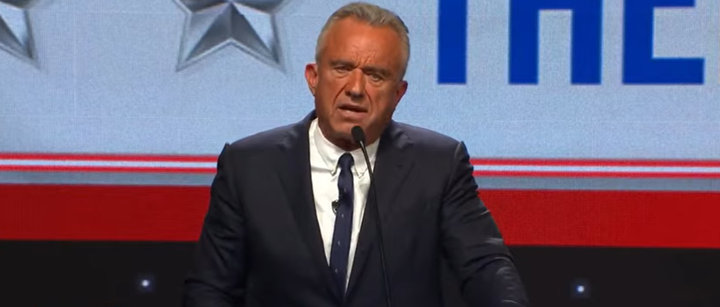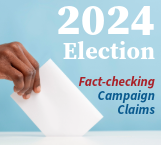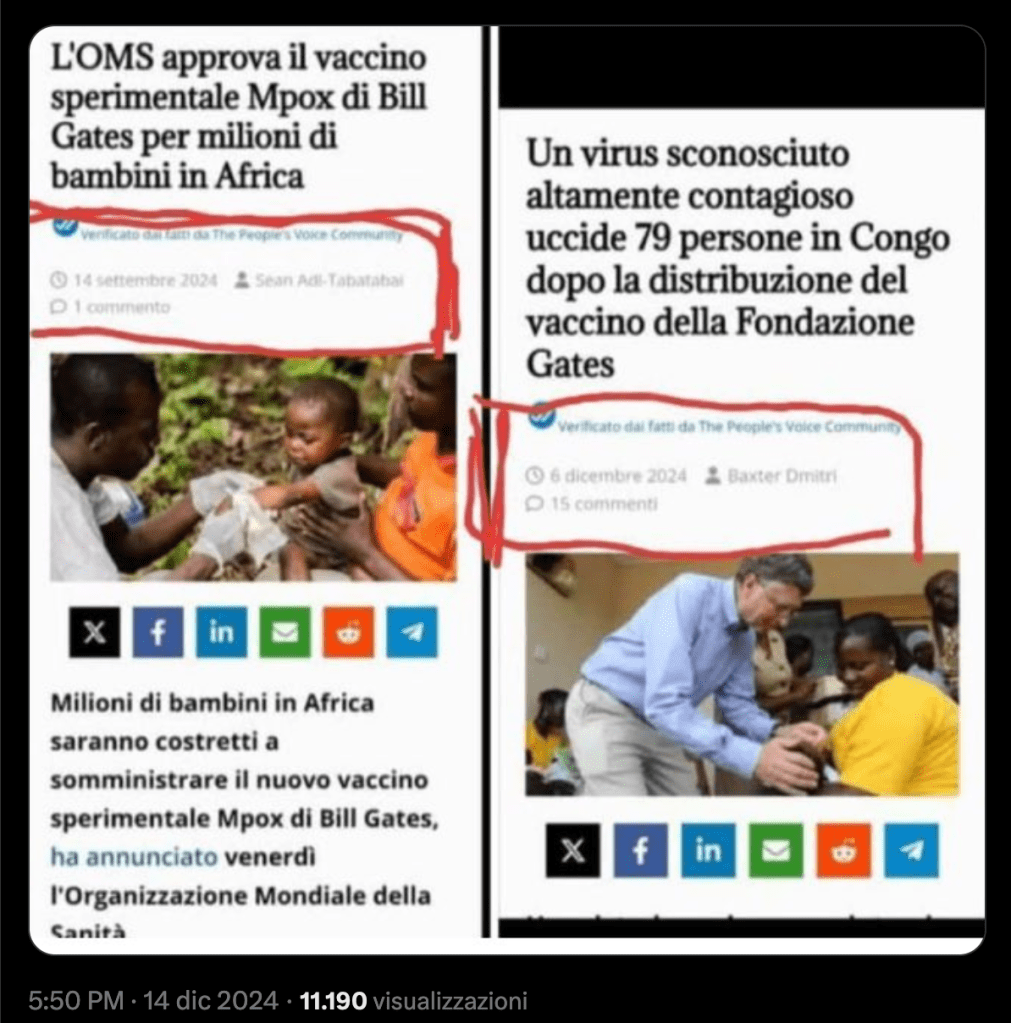
Este artículo estará disponible en español en El Tiempo Latino.
Summary
Excluded from the CNN presidential debate between President Joe Biden and former President Donald Trump on June 27, independent candidate Robert F. Kennedy Jr. livestreamed a parallel debate on social media, answering the same questions put to the major party candidates.
In our fact check of the CNN debate, we described a “relentless barrage of false and misleading statements” from the two candidates, and in Kennedy’s addition — what he called the “real debate” — he added a few of his own distortions and falsehoods.
- Kennedy made a few unsupported and inaccurate claims about Russia’s invasion of Ukraine and Russian President Vladimir Putin’s motives for the invasion.
- He falsely claimed that Trump “spent more money in office than every president in the United States history combined.” Federal outlays during Trump’s presidency didn’t come close the $79 trillion the government spent before he took office.
- Kennedy incorrectly claimed Trump and Biden “shut down every business in our country” during the COVID-19 pandemic, falsely adding that the businesses were forced to close for “no scientific reason.”
- He also blamed Trump and Biden’s pandemic policies for transferring wealth to billionaires, but misleadingly used global statistics.
- Kennedy misleadingly claimed that “Russians are in Cuba firing missiles” as a warning to the U.S. about its resolve to win the war with Ukraine. Russian warships on the way to an annual trip to Cuba conducted simulated missile drills in the Atlantic but did not fire live missiles from Cuba.
- Kennedy proposed taxing marijuana to fund free “rehabilitation farms” to treat “depression … alcoholism, drug addiction to illegal drugs, but also addiction to SSRI’s, to Benzos, Adderall.” Selective serotonin reuptake inhibitors, or SSRI, are not considered to be addictive.
Kennedy’s rival “debate” was livestreamed June 27 on X, formerly known as Twitter.
Analysis
Kennedy on Russia’s Invasion of Ukraine
Kennedy made a few unsupported and inaccurate claims about Russia’s invasion of Ukraine and Russian President Vladimir Putin’s motives for the invasion.
Steven Pifer, a former ambassador to Ukraine who is now a nonresident senior fellow at the Brookings Institution, said Kennedy’s remarks were “full of inaccuracies.”

Kennedy, son of the late U.S. Attorney General Robert F. Kennedy and nephew of the late President John F. Kennedy, misleading claimed that “the only thing Putin wanted was to keep NATO out of the Ukraine,” falsely adding that Putin “didn’t even want to take Ukraine.”
He also blamed Biden for extending the war when Putin was ready to accept a deal to end it, and he incorrectly said that Putin “first invaded” Ukraine “with only 40,000 troops.”
Putin illegally annexed Crimea, then part of Ukraine, in March 2014, and has been trying for years to prevent Ukraine from joining NATO. But he has signaled that his goals go beyond that.
In an article last month for the Council on Foreign Relations, Russian expert and council fellow Thomas E. Graham writes that Putin’s “goals fall into three baskets: weakening or disrupting Ukraine’s ties with the North Atlantic Treaty Organization (NATO), stymieing Ukrainian nationalism, and expanding territorial gains.”
Peter Dickinson, editor of the UkraineAlert blog at the Atlantic Council’s Eurasia Center, wrote that Putin’s goal is to create a “new Russian Empire.”
“Putin has launched the largest European conflict since WWII for the simple reason that he wants to conquer Ukraine,” Dickinson writes. “Inspired by the czars of old, Putin aims to crush his neighbor and incorporate it into a new Russian Empire.”
In his article, Dickinson cites Putin’s remarks on the 350th anniversary of Russian Czar Peter the Great on June 9, 2022, when Putin spoke about wanting to “return” Russian territory, as Reuters wrote.
Reuters, June 9, 2022: “Peter the Great waged the Great Northern War for 21 years. It would seem that he was at war with Sweden, he took something from them. He did not take anything from them, he returned (what was Russia’s),” Putin said after a visiting an exhibition dedicated to the tsar.
In televised comments on day 106 of his war in Ukraine, he compared Peter’s campaign with the task facing Russia today.
“Apparently, it also fell to us to return (what is Russia’s) and strengthen (the country). And if we proceed from the fact that these basic values form the basis of our existence, we will certainly succeed in solving the tasks that we face.”
In response, a senior advisor to Ukrainian President Volodymyr Zelenskiy dismissed what he called any attempt to legalise the theft of land.
Kennedy, who claimed that Putin “has been asking to settle this war from the beginning,” blamed Biden for extending the war “to weaken Russia.”
“Putin was withdrawing his troops, leaving Donbas and Luhansk,” Kennedy said, referring to eastern Ukraine. “And what happened? President Joe Biden sent [then-UK Prime Minister] Boris Johnson over to Kyiv and forced Zelenskyy to tear up that agreement because they had another agenda, which is to weaken Russia.”
But Pifer, the Brookings Institution senior fellow, called Kennedy’s claim “nonsense.”
“In March 2022, the Russians, having failed to take Kyiv, withdrew their forces from northern Ukraine and announced that they would shift the focus of their attack to Donbas (which is Luhansk and Donetsk combined),” Pifer said. “At that point, the Ukrainians were liberating towns such as Bucha and saw the many atrocities (summary executions, torture chambers, children deported to Russia) and their attitude hardened on negotiations.”
As for its troop size at the start of the Ukraine war, Russia built its forces on the Ukraine border throughout 2021, as we wrote in a timeline of events leading up to the war. In early December 2021 — more than two months before the war started — U.S. intelligence estimated that Russia had about 70,000 troops along the Ukrainian border, according to the Washington Post.
On Feb. 22, 2022, Russia first entered Ukraine’s Donbas region in what Russian officials described as a peace-keeping mission. The next day, the Pentagon said Russia had between 160,000 and 190,000 troops on the Ukraine border.
The full scale invasion occurred on Feb. 24, 2020, and within four days the Pentagon estimated that almost 75% of Putin’s army entered Ukraine — which, at the low end, would be 120,000 of the 160,000 troops that were amassed on the Ukraine border in preparation for war. That’s three times larger than Kennedy’s claim of only 40,000 Russian soldiers.
Pifer said it was even higher than that.
“No serious analyst has suggested the Russian invasion force numbered only 40,000 troops,” Pifer said. “The generally accepted number is closer to 200,000.”
Trump’s Spending
Kennedy made a false claim about Trump while criticizing the amount of federal spending during his administration.
“President Trump came into office promising to balance the budget,” Kennedy said. “Instead, he spent more money in office than every president in the United States history combined. George Washington to George W. Bush, 283 years of history.”
Kennedy’s spending comparison is wrong.
From fiscal year 2017 to fiscal year 2020, which includes all but three months of Trump’s four-year term, federal outlays totaled about $19 trillion, according to data from the Office of Management and Budget. There was an additional $6.8 trillion spent in fiscal 2021, when Trump was president for roughly three and a half months and signed some spending bills.
But that doesn’t come close to the combined total of about $79 trillion spent during the administrations of all other presidents before Trump took office.
If Kennedy meant to refer to debt, considering that he later mentioned the debt going up by more than $6 trillion under President Joe Biden, his claim would still be inaccurate.
Under Trump, the total national debt increased by about $7.8 trillion and there was a $7.2 trillion increase in the debt held by the public, which excludes money the government owes to itself. As we’ve written, Trump alone is not responsible for all that debt, since the debt added during a president’s term includes the fiscal impact of actions that predate their administration. Congress also plays a role.
However, when Trump was inaugurated in January 2021, the publicly held debt already was roughly $14.4 trillion and the total national debt was over $19.9 trillion. So, the amount added to the debt during his administration was still less than the cumulative debt of all the presidents who preceded him.
COVID-19
Kennedy confused and exaggerated several aspects of the COVID-19 response and the resulting economic effects.
“These two presidents shut down every business in our country, 3.3 million businesses with no due process, no just compensation,” he said. “There was no scientific reason to do this.”
As we’ve explained before, when Kennedy blamed Biden for business shutdowns, the pandemic closures occurred on Trump’s watch, since that was when the pandemic began. But Trump didn’t have the authority to shut down businesses. The federal government issued guidelines; many state and local jurisdictions then implemented temporary non-essential business closures.
Not “every” business closed, of course. Essential businesses were allowed to stay open. Kennedy’s figure of 3.3 million likely comes from an August 2020 study from a University of California, Santa Cruz economist, and reflects the number of working small businesses lost between February and April of 2020. By June 2020, there was a “partial rebound,” according to the study, with a net decline of 1.2 million small businesses since February.
It’s worth noting that the government did provide some financial assistance to businesses affected by the pandemic.
Kennedy also misleadingly claimed that there was no scientific rationale for the business closures — a claim he repeated when discussing restrictions on church gatherings. At the time, scientists knew a new respiratory virus — without a vaccine or treatments available — was easily spreading between people. One of the few tools available was to limit people’s exposure to others, which included closing non-essential businesses and recommending against large gatherings, including religious services. Multiple studies have since found protective effects of such mitigation measures, although others have not.
Kennedy repeated two of his favorite claims about the pandemic enriching the wealthy. Speaking of both Trump and Biden, he said, “They shifted $4.3 trillion upward to this new oligarchy of billionaires … They created a billionaire a day, in 500 days.”
As we’ve explained before, the 500 new billionaires figure likely comes from a Forbes article, which reported 493 newcomers to the outlet’s billionaire list for 2021. But the tally is global, with only 98 in the U.S. Similarly, while it’s unclear where Kennedy sourced his roughly $4 trillion figure, he may be citing a 2022 Oxfam analysis, which is also global and not specific to the U.S. or its policies.
Russians Not ‘in Cuba Firing Missiles’
Kennedy misleadingly claimed that “Russians are in Cuba firing missiles because they’ve warned us: ‘We aren’t going to … lose the war in Ukraine.’” Russian warships on the way to an annual trip to Cuba conducted simulated missile drills in the Atlantic and did not fire live missiles from Cuba, which lies just several hundred miles from the Florida coast.
Kennedy’s claim mirrors a popular social media meme that we debunked on June 14. The social media posts shared clips of a years-old video of missiles launched from a Russian ship and a submarine surfacing, to falsely claim the Russian ships recently fired live missiles “off the coast of Florida” to show off their firepower to the U.S.
A spokesperson for the Department of Defense, which was closely tracking the activities of the ships, told us via email that claims that a Russian ship fired missiles near the Florida coast while en route to Cuba, is “not true.”
U.S. officials told the New York Times that the Russian warships posed no threat and were not carrying nuclear weapons. The Department of Defense has been monitoring the movement of the ships through the Atlantic Ocean, a spokesperson told the Times. The Russian Ministry of Defense said the warships practiced locating targets and used precision missiles to simulate destroying those targets at distances of more than 350 miles, according to the Times.
According to Al Jazeera, “The drills, by the submarine Kazan and the warship Admiral Gorshkov, involved firing high-precision missiles at mock enemy targets from a distance of more than 600km (370 miles), it said in a statement on Tuesday. The Admiral Gorshkov also conducted training in recent days to repel an air attack, the ministry said.”
Al Jazeera cited an anonymous U.S. official that the Russian exercises were “about Russia showing that it’s still capable of some level of global power projection.”
SSRI Antidepressants
When talking about the opioid crisis, Kennedy said both Biden and Trump “missed the point.” The problem is not the border, he said, but “something much larger than that — it’s a generation that is alienated, that is dispossessed, that is depressed, that is suicidal, that is disconnected from community, and that is why they’re turning to drugs.”
His proposed solution is to tax marijuana and with those funds — “8.5 billion dollars in revenue,” he said, citing this report — build “rehabilitation farms” where people can be treated for free from depression, drug and alcohol addiction, “but also addiction to SSRI’s, to Benzos, Adderall,” he said, referring to benzodiazepines, a medication that slow down the nervous system.
Selective serotonin reuptake inhibitors, or SSRIs, are a very common type of antidepressant. People who stop taking them abruptly might experience symptoms similar to those of withdrawal, such as nausea, dizziness and lethargy, which are described as “discontinuation syndrome.” But SSRIs are not considered to be addictive.
SSRI antidepressants are considered safe and side effects are usually temporary or mild. There are concerns that children and adolescents taking SSRI antidepressants may have an increased risk for suicidal behavior, but studies are not conclusive and some have found that the decrease of antidepressant use have in turn increased suicidal attempts. In general, the benefits of treatment outweigh the risks of not treating depression, including suicide.
Kennedy has repeatedly blamed these antidepressants for the rise in school shootings.
Editor’s note: FactCheck.org does not accept advertising. We rely on grants and individual donations from people like you. Please consider a donation. Credit card donations may be made through our “Donate” page. If you prefer to give by check, send to: FactCheck.org, Annenberg Public Policy Center, 202 S. 36th St., Philadelphia, PA 19104.
Sources
Pifer, Steven. “Crimea: Six years after illegal annexation.” Brookings Institution. 17 March 2020.
Pifer, Steven, nonresident senior fellow, Brookings Institution. Email sent to FactCheck.org. 28 Jun 2024.
Graham, Thomas. “What Does Putin Really Want in Ukraine?” Council on Foreign Relations. 16 May 2024.
Dickinson, Peter. “Putin admits Ukraine invasion is an imperial war to ‘return’ Russian land.” Atlantic Council. 10 June 2022.
“Hailing Peter the Great, Putin draws parallel with mission to ‘return’ Russian lands.” Reuters. 9 Jun 2022.
Kiely, Eugene and Robert Farley. “Russian Rhetoric Ahead of Attack Against Ukraine: Deny, Deflect, Mislead.” 24 Feb 2022.
Dettmer, Jamie. “As Russian Tanks Roll, Fears Grow They Won’t Stop in Eastern Ukraine.” Voice of America. 22 Feb 2022.
Garamone, Jim. “Ukrainians Continue Resistance as Russia Funnels More Troops Into the Country.” DOD News. 28 Feb 2022.
Garamone, Jim. “Defense Official Says Russian Forces Ready to Launch Attack on Ukraine.” DOD News. 23 Feb 2022.
Gore, D’Angelo et al. “FactChecking RFK Jr.’s V.P. Announcement.” FactCheck.org. 27 Mar 2024.
“Covid-19 Economic Relief.” U.S. Department of the Treasury. Accessed 28 Jun 2024.
Jaramillo, Catalina and Yandell, Kate. “RFK Jr.’s COVID-19 Deceptions.” FactCheck.org. 11 Aug 2023.
“Selective serotonin reuptake inhibitors (SSRIs).” Mayo Clinic. 17 Sep 2019.
“What are the real risks of antidepressants?” Harvard Health Publishing. 17 Aug 2021.
“Side effects – Selective serotonin reuptake inhibitors (SSRIs).” NHS. 8 Dec 2021
Lagerberg, Tyra, et al. “Selective serotonin reuptake inhibitors and suicidal behaviour: a population-based cohort study,” Neuropsychopharmacology. 24 Sep 2021.
“Teen suicide tries increased after FDA toughened antidepressant warning.” Harvard Health Publishing. 20 Jun 2014.
Al Jazeera. “Russian vessels conduct missile drills in Atlantic on way to Cuba.” 12 Jun 2024.
Jaffe, Alan. “Posts Misrepresent Old Video of Missile Test as Russian Ships Visit Cuba.” FactCheck.org. 14 Jun 2024.
Sampson, Eve. “Russian Warships Enter Havana Harbor as Part of Planned Exercises.” New York Times. 12 Jun 2024.
Office of Management and Budget. Table 1.1—Summary of Receipts, Outlays, and Surpluses or Deficits (-): 1789–2029. Accessed 28 Jun 2024.
U.S. Department of Treasury. Debt to the Penny. Accessed 28 Jun 2024.
Robertson, Lori. “Biden Leaves Misleading Impression on U.S. Debt.” FactCheck.org. 13 Aug 2021.
The post FactChecking RFK Jr.’s Rival Debate appeared first on FactCheck.org.

 5 months ago
66
5 months ago
66


